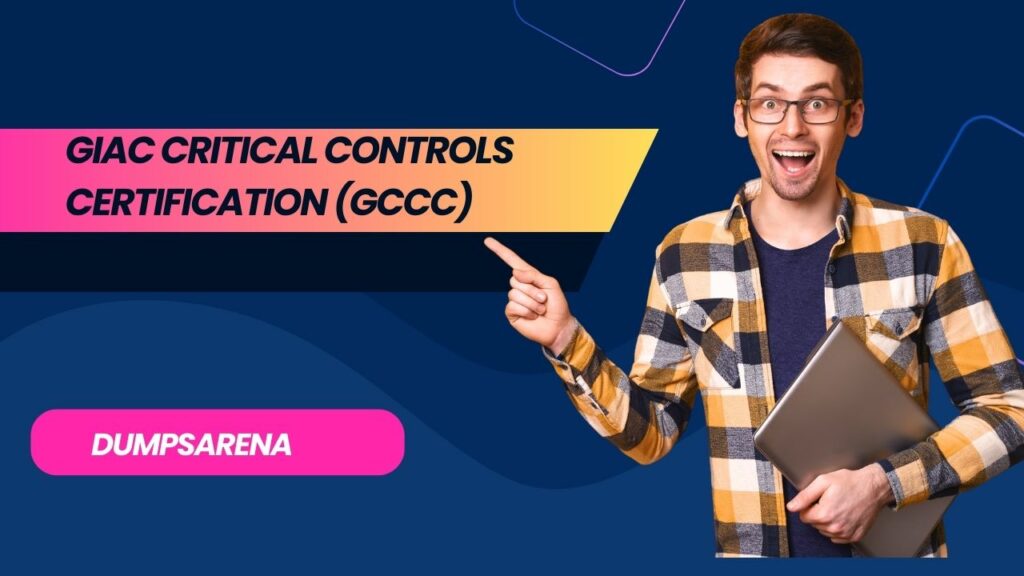Overview of GIAC Critical Controls Certification (GCCC) and its importance
The Global Information Assurance Certification (GIAC) Critical Controls Certification (GCCC) stands as a testament to an individual's proficiency in implementing and managing the Critical Security Controls recommended by the Centre for Internet Security (CIS). These controls are a prioritised set of practices designed to prevent the most pervasive and dangerous cyber threats. The certification underscores the importance of a systematic approach to cybersecurity, focusing on the protection of critical assets, data, and network infrastructure.
Professionals who earn the GCCC are recognised for their expertise in applying these best practices to secure IT systems against threats. The GIAC Critical Controls Certification (GCCC) is especially pertinent for security personnel, including managers, auditors, and IT staff, who are responsible for protecting sensitive information and ensuring the resilience of their organisation's cyber defences. It validates their capability to not only understand but also effectively implement the Critical Security Controls.
In an era where cyber threats are increasingly sophisticated and pervasive, the GCCC serves as a crucial benchmark for cybersecurity excellence. Organisations that employ GCCC-certified individuals demonstrate a commitment to a high standard of security practices, thereby enhancing their credibility and trustworthiness in the eyes of clients, stakeholders, and regulatory bodies. Consequently, the GCCC carries significant weight within the industry, marking a vital step for professionals seeking to advance their cybersecurity careers and for organisations striving to fortify their cyber defences.
Explaining the GIAC Critical Controls Certification (GCCC) process and prerequisites
The GIAC Critical Controls Certification (GCCC) process is a comprehensive pathway designed to validate the skills and knowledge of information security professionals. The journey begins with choosing a certification that aligns with the candidate's career goals and expertise. GIAC offers a wide array of certifications catering to different aspects of cybersecurity, such as penetration testing, incident response, and forensics. Following this, candidates typically enrol in a training course, although it is not mandatory. SANS Institute courses are often the preferred preparation method, as they are tailored to GIAC exam content.
Once prepared, the candidate must register for the relevant GIAC exam. Prerequisites vary depending on the certification but generally include a combination of practical experience and education in the field. The exams are proctored and can be taken online or at approved testing centres. Candidates must demonstrate mastery of the subject matter through a series of scenario-based questions and simulations.
Upon passing the exam, the professional is awarded the GIAC certification, which is valid for four years. To maintain the certification, holders must earn Continuing Professional Education (CPE) credits through various activities such as attending conferences, completing additional training, or contributing to the cybersecurity community. This continuous learning requirement ensures that GIAC-certified professionals remain current with the evolving landscape of cyber threats and defence strategies.
Benefits of obtaining the GIAC certification for professionals
Obtaining a GIAC Critical Controls Certification (GCCC) offers a multitude of benefits for professionals in the field of information security. Primarily, it serves as an endorsement of one's technical abilities and knowledge, providing an edge in a competitive job market. GIAC certifications are globally recognised and respected, signalling to employers that the holder has undergone rigorous training and assessment to meet high industry standards. This can translate into better job prospects, higher earning potential, and opportunities for career advancement.
Professionals with GIAC certifications are also better equipped to handle the complex challenges of cybersecurity. The certifications focus on practical, hands-on skills that are directly applicable to real-world scenarios. This ensures that certified individuals are not only theoretically knowledgeable but also capable of implementing and managing security measures effectively. As a result, these professionals can contribute significantly to the security posture of their organisations, reducing the risk of breaches and enhancing overall cyber resilience.
Moreover, the requirement for continuing education as part of maintaining the certification ensures that GIAC-certified professionals stay updated with the latest trends, tools, and techniques in cybersecurity. This commitment to lifelong learning is crucial in an industry that evolves at a rapid pace, and it positions certified individuals as lifelong learners who are dedicated to maintaining excellence in their field.

Key critical controls covered by the GIAC Critical Controls Certification (GCCC)
The GIAC Critical Controls Certification (GCCC) encompasses a range of critical controls that are essential for robust cybersecurity management. Among these, asset inventory and control are fundamental, ensuring that all hardware and software assets within an organisation are accurately identified, managed, and secured. Secure configurations for hardware and software on mobile devices, laptops, workstations, and servers form another critical control, aimed at establishing a solid foundation for a secure IT environment.
Continuous vulnerability assessment and remediation are also covered, which involve regular scanning for weaknesses and the prompt patching of software to mitigate potential threats. Another key control is the management of administrative privileges, which ensures that only authorised users have access to critical systems and information, thus reducing the risk of insider threats or exploitation by attackers.
Moreover, GIAC-certified professionals are well-versed in the control of network ports, protocols, and services, which helps in minimising windows of vulnerability by managing network services at the host level. Finally, the certification addresses the importance of data protection through the implementation of data recovery capabilities and the secure configuration of network devices to prevent data exfiltration and manipulation. These controls, among others, are integral to the GIAC certification, equipping professionals with the necessary skills to safeguard digital assets effectively.
The role of GIAC certification in enhancing cybersecurity measures
The GIAC Critical Controls Certification (GCCC) plays a pivotal role in bolstering cybersecurity measures within organisations. By setting a rigorous standard for professionals, it ensures that those responsible for protecting information systems possess a deep and practical understanding of security principles and techniques. Individuals with GIAC certification are adept at identifying and mitigating vulnerabilities, employing advanced tools and methodologies to safeguard against cyber threats. Their expertise is particularly valuable in designing and implementing security policies that are both robust and adaptable to the changing threat landscape.
Certified professionals are also instrumental in fostering a culture of security awareness throughout their organisations. They lead by example, promoting best practices and educating their colleagues on the importance of cybersecurity. This has a multiplier effect, enhancing the overall security posture and reducing the likelihood of human error, which is often the weakest link in security chains.
Furthermore, GIAC Critical Controls Certification (GCCC) helps organisations to comply with industry regulations and standards. Certified professionals are knowledgeable about legal and regulatory requirements related to cybersecurity, which can aid in avoiding costly breaches and penalties. In essence, GIAC Critical Controls Certification (GCCC) equips professionals with the skills to not only react to incidents but also to proactively manage and prevent them, thereby playing a crucial role in the fortification of cybersecurity measures.
Comparison with other cybersecurity certifications
When comparing the GIAC Critical Controls Certification (GCCC) with other cybersecurity certifications, several distinctive attributes emerge. Unlike some certifications that may focus on theoretical knowledge, GIAC is highly regarded for its emphasis on practical, technical skills and the ability to apply them in real-world situations. This contrasts with certifications like CompTIA Security+, which is often considered an entry-level qualification, providing a broad overview of security concepts without delving deeply into hands-on skills.
Another well-known certification, the Certified Information Systems Security Professional (CISSP), offered by (ISC)², is aimed at experienced security practitioners, managers, and executives, focusing on security management and operations. While the CISSP is a benchmark for security management expertise, GIAC certifications are more numerous and specialised, allowing professionals to demonstrate mastery in specific areas such as penetration testing, incident response, or forensics.
Certified Ethical Hacker (CEH) by EC-Council is another popular certification that shares some similarities with GIAC's offerings, especially in penetration testing. However, GIAC Critical Controls Certification (GCCC) are often seen as more advanced, with a reputation for being more rigorous and in-depth. In summary, while there are many cybersecurity certifications available, GIAC stands out for its specialised, skill-based approach and is highly valued among professionals seeking to demonstrate a high level of competency in specific cybersecurity domains.

Preparing for the GIAC certification: study materials and courses
Preparing for a GIAC Critical Controls Certification (GCCC) requires a strategic approach to study and the utilisation of a variety of materials and courses. SANS Institute, closely affiliated with GIAC, provides a range of training options tailored to the certifications on offer. These include in-depth courses that are available both online and in-person, featuring lectures, hands-on labs, and simulations that mirror real-world scenarios. The courses are designed to equip candidates with the knowledge and skills necessary to succeed in GIAC examinations.
Aside from SANS courses, there are official GIAC study guides and practice tests that allow candidates to familiarise themselves with the exam format and question types. Practice tests, in particular, are invaluable for identifying areas of strength and weakness, enabling focused study in the lead-up to the exam. Additionally, many candidates benefit from participating in online forums and study groups, which provide community support and the sharing of resources and tips.
It is important for candidates to create a study plan that aligns with their personal learning style and schedule. This may include setting aside regular study times, breaking down the syllabus into manageable sections, and ensuring a balanced approach to learning, with time allocated for review and rest. By combining these resources and strategies, candidates can enhance their readiness for GIAC Critical Controls Certification (GCCC) exams and increase their chances of success.
Career opportunities and pathways after achieving the GIAC certification
Achieving a GIAC Critical Controls Certification (GCCC) can significantly broaden a professional's career opportunities and pathways in the cybersecurity domain. With its emphasis on specialised skills and practical knowledge, the certification is highly valued by employers across various sectors, including government, finance, healthcare, and technology. Professionals with GIAC credentials are often considered for roles that require a high level of trust and expertise, such as security analysts, incident responders, forensic investigators, and compliance auditors.
The certification can also serve as a stepping stone to more advanced positions, like cybersecurity managers or consultants, who are tasked with overseeing an organisation’s security strategy and managing teams of security specialists. For those inclined towards leadership, the GIAC certification can validate their technical proficiency and help them transition into roles that shape security policies and procedures at a higher level.
Moreover, the GIAC Critical Controls Certification (GCCC) can open doors to international opportunities, as its recognition is not confined to a single region but extends globally. This allows certified professionals to pursue careers abroad or with multinational corporations that require a workforce skilled in defending against a diverse range of cyber threats. Ultimately, the GIAC certification provides a robust framework for career development, enabling professionals to navigate the cybersecurity landscape with confidence and authority.
Comments (0)